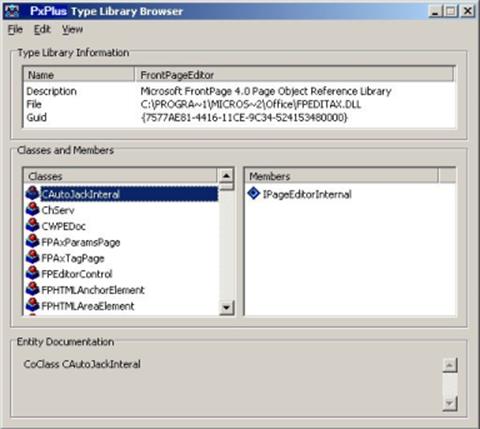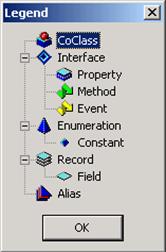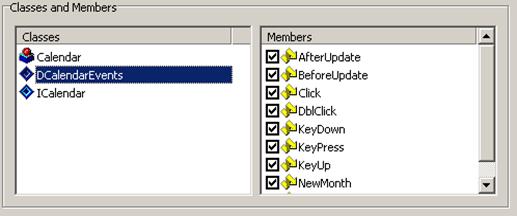1.
Start the Type Library Browser by launching PVXTLB.EXE from Windows Explorer or via Start > Run.
2.
Select Open from the File menu to display all registered OLE/COM objects. The Registered Type Libraries window displays.
3.
Scroll down and select Microsoft Calendar Control. The type library information for the Microsoft Calendar Control is loaded into the Type Library Browser. See the illustration below.
The Type Library Information section includes a description of the object, the location and name of the OCX file, and the GUID. (This can be stored internally in this OCX file or in a separate file with a .TLB extension.)

The Classes and Members lists contain all the components of this control.
The Entity Documentation section provides more detail for the selected item, including type information and parameter lists.
4.
Click on the Calendar object in the Classes list. This shows that the Calendar object has two members: DCalendarEvents and ICalendar.
5.
The icon to the left of each item denotes the class type. To see a complete list of the icons used to identify class types in the Type Library Browser, select Legend from the View menu. See the illustration below.

The class types are:
|
CoClass |
A CoClass is a COM class that contains a collection of interfaces defined by the COM object. The Calendar class is considered a CoClass object. |
|
Interface |
An interface is a class that exposes methods, properties and events for use by other objects. The DCalendarEvents and ICalendar classes are interfaces. |
|
Property |
Properties are the class's member variables that represent the class's current state. Typically, properties should only be set or read by class methods. See PxPlus Object-Oriented Programming for information on class functions and properties. |
|
Method |
Essentially, methods are similar to PxPlus class functions. They direct the control's behavior. |
|
Event |
COM objects can generate events to let the host object know something has changed; e.g. when a user clicks a button changing the current month, the Calendar object may fire a NewMonth event. This event will be dispatched to any host object that has registered to listen for NewMonth events. |
|
Enumeration |
An Enumeration is a collection of related integer constants. COM object's Constants are only accessible through Enumerations. |
|
Constant |
Constants are attributes that cannot be changed, usually numbers; e.g. an OCX that controls a multi-line object has three constants representing the possible alignment of text: left, right and center. These constants would be exposed through an Enumeration. |
|
Record |
Records represent collections of elements called fields. |
|
Field |
A field is an element variable contained in a record (much like a single field in an IOList for a file). |
|
Alias |
An alias is a data type that is a reference to another data type. |
6.
Close the Legend window and select the ICalendar class. The Members list will now display the methods and properties of the ICalendar class. This class contains about a dozen methods with names, such as NextWeek( ) and NextYear( ), which can be accessed using the PxPlus OCX/COM Interface.
7.
Select the DCalendarEvents class from the Classes list. The Members list will display all the methods, properties and events supported by the DCalendarEvents class.

Check boxes identify which members are to be used by the Type Library Browser for generating an event template (see Creating an Event Template below). Initially, they are all selected by default. This defines all the events the Calendar control can fire.